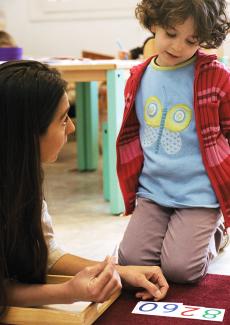
Overcoming the Pitfalls of Early Childhood Assessment
October 3, 2014
In the age of accountability, data collection seems to be in vogue. Data are now routinely collected nationwide on children, classrooms, and teachers. The data help teachers and schools improve their programs to meet the needs of children attending. Most states are conducting child assessments in early childhood classrooms (including Kindergarten Entry Assessments). The relevant literature has classified two types of assessment for children, summative and formative. Summative assessment provides teachers with a snapshot of student’s understanding which is useful for summarizing student learning. Formative assessment occurs during instruction and provides teachers with a tool to improve student achievement by informing instruction with these data in an ongoing process.

Assessing children is often “unreliable” as young children’s performance is not necessarily consistent over even short periods of
time, and contextual influences and emotional states are especially relevant for this group. For these reasons, tests administered at one point in time alone may not provide an accurate picture of the child’s concept knowledge, skills, or understanding. Teachers need an effective assessment to understand children’s development and to help guide their instruction. This instrument should allow them to collect evidence about what students know, determine their skills, and measure their strengths and weaknesses. Researchers at NIEER have developed the Early Learning Scale (ELS) for preschool children, and have recently completed developing and evaluating the Kindergarten Early Learning Scale (KELS) to do just this.
The ELS and KELS observation-based scales offer teachers:
- The opportunity to assess learning in the children’s natural environment during typical instruction;
- An assessment of children’s development and skills across several domains;
- An assessment approach that focuses on strengths and interests of children;
- Information on children’s progress, to share with parents, that is understandable and complete; and
- Data to inform their teaching practices and report on student growth.
The ELS and KELS are used by teachers of young children as they become participant-observers and engage in an iterative process over time. They can implement a formative assessment process that includes:
- observing and investigating young children’s individual behaviors as a seamless part of instruction;
- documenting and reflecting on the evidence;
- analyzing and evaluating the data in relation to set goals or a trajectory of learning;
- hypothesizing and planning which considers what the children are demonstrating and the implications for instruction; and
- guiding and instructing where the data helps the teacher target the needs of the children and scaffold their learning to the next level.
The ELS and KELS fill a need for a succinct and manageable way to assess preschool and kindergarten children across domains. NIEER researchers developed these instruments to be responsive to teachers request for a multi-domain assessment that can be used to improve teaching and learning, without overburdening the teacher. The ELS and KELS provide this by spanning several domains (math, science, social and emotional, language and literacy, and physical development), but maintaining a manageable number of items to evaluate.
Items are included in the ELS and KELS for skills that:
- are measurable/observable;
- develop on a continuum; and
- are critical to present and future learning, as defined by research.
A new report from NIEER confirms that the KELS is a reliable and valid measure. Teachers were able to achieve acceptable reliability with a mean of .70 on the instrument. This indicates that teachers are able to effectively score data consistently across programs. Further, results demonstrated acceptable levels of validity with moderate relationships with standardized measures in appropriate and meaningful ways. This means that the items on the KELS that align with the content of the standardized test relate well and those same items appropriately do not relate well to standardized tests that measure different constructs.
For more information about using the ELS or KELS contact me at sayers@nieer.org.
–Shannon Riley-Ayers is an Assistant Research professor for NIEER/CEELO.
About NIEER
The National Institute for Early Education Research (NIEER) at the Graduate School of Education, Rutgers University, New Brunswick, NJ, conducts and disseminates independent research and analysis to inform early childhood education policy.
